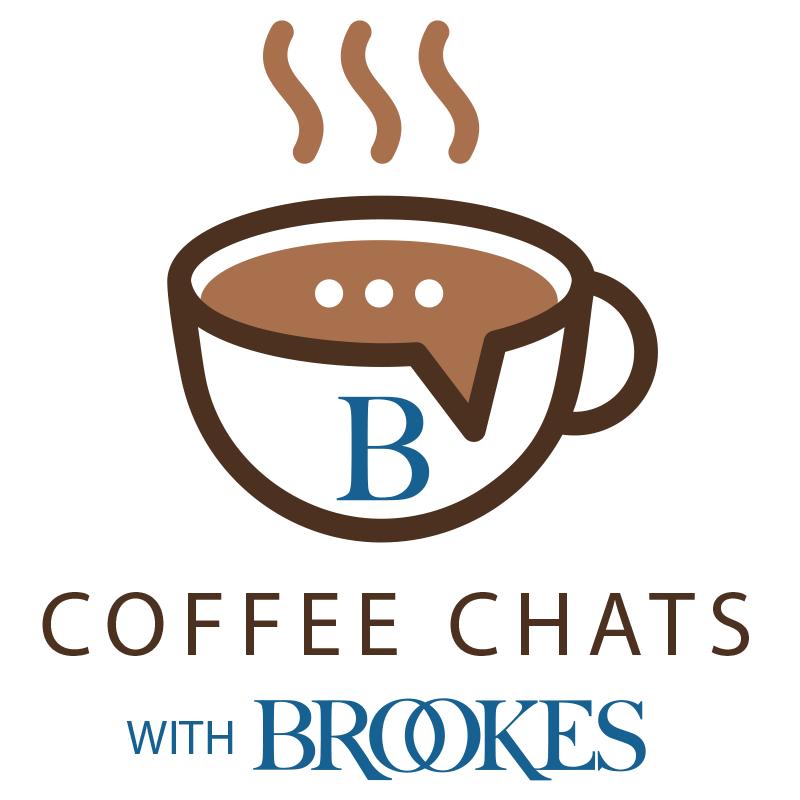
9 minute read
Behavior/Social-Emotional Learning
DEAR EDUCATOR,
After months of unprecedented change and upheaval, a new school year under way. As we write this, it’s hard to know exactly how that new year will unfold. But whether your building is opening or not, two things are certain: Learning will continue in your capable hands, and your students will need your sensitive care and support.
We’re here to help make the transition back to school a little easier for you and your new students.
On the next few pages, you’ll find some books that will help you integrate traumasensitive teaching practices and positive behavior supports, including a brand-new book from Jen Alexander with specific guidance on helping students as they return from school closures. And if you haven’t already seen our free coffee chat series, don’t miss these videochats with our authors (https://bit.ly/Coffee-Chats), who share immediately useful tips on topics like supporting grieving students, facilitating teacher-student mediation, engaging all learners, and adopting effective self-care strategies.
We know this situation is changing all the time, and we’ll be watching and responding with blog posts, videochats, and other resources. If you need help finding a resource that can address your challenges, please don’t hesitate to reach out to us (https://bit.ly/ Brookes-Contact).
You’re making this work, you’re doing great, and we’re here to help.
The Grieving Student A Teacher's Guide
By David J. Schonfeld, M.D., & Marcia Quackenbush, M.S., MFT, CHES
“If there were just one book I would recommend to the teachers of my children, this absolutely would be it." —Therese A. Rando, Clinical Director, The Institute for the Study and Treatment of Loss
David Schonfeld, nationally renowned expert on childhood bereavement and school crisis, teams with family therapist Marcia Quackenbush to guide you through a child’s experience of grief and loss and give you real-world insights on how to help.
Respond constructively to children’s feelings and behaviors after a death Initiate and maintain positive, helpful communication Learn what to say and what not to say when a child or family is grieving Use simple commemorative activities at school to help students cope
$34.95 | Stock #: 20202-71165 | 2010 | 208 pages | 6 x 9 | paperback | ISBN 978-1-59857-116-5
Supporting Students with Emotional and Behavioral Problems By Lee Kern, Ph.D., Michael P. George, Ed.D., & Mark D. Weist, Ph.D.
Developed by trusted PBS and child mental health experts and packed with concrete strategies, this book presents a highly effective tiered approach to preventing and reducing severe behavior problems and increasing academic engagement.
Improve the behavior of K–12 students with or without a specific diagnosis Identify student mental health problems and select appropriate interventions Boost your behavior management skills and empower yourself to take action Directly teach social skills during everyday routines
$39.95 | Stock #: 20202-78065 | 2016 | 304 pages | 7 x 10 | paperback | ISBN 978-1-59857-806-5
COMING SOON
The Re-Set Process
Trauma-Informed Behavior Strategies By Dyane Lewis Carrere, M.Ed., with Wynne Kinder, M.Ed.
When students with histories of trauma struggle with self-regulation and challenging behaviors, traditional interventions often fall short. That’s why the teachers on your staff need this reader-friendly guide to the revolutionary Re-Set Process, a four-step, neurosciencebased approach to improving behavioral success for children in Grades K–8 with a history of trauma. This comprehensive guide to the Re-Set Process shows educators how to:
Interpret students’ behavior through a trauma-informed lens
Address challenging behavior proactively and reactively
Manage classrooms effectively by creating predictability, protecting emotional safety, and nurturing relationships
Build students’ regulation skills with a wealth of activities and exercises
Successfully implement the Re-Set Process with clear step-by-step instructions
Provide timely, specific behavioral feedback that promotes a positive classroom culture
Integrate essential self-care strategies into the school day PRACTICAL MATERIALS: Case studies, insightful Notes From the Field, and a package of more than 30 online downloads, including planning forms, blank templates, activity sheets, and a book study guide.
$39.95 | Stock #: 20202-54197 | October 2020 | approx. 296 pages | 8 ½ x 11 | paperback | ISBN 978-1-68125-419-7
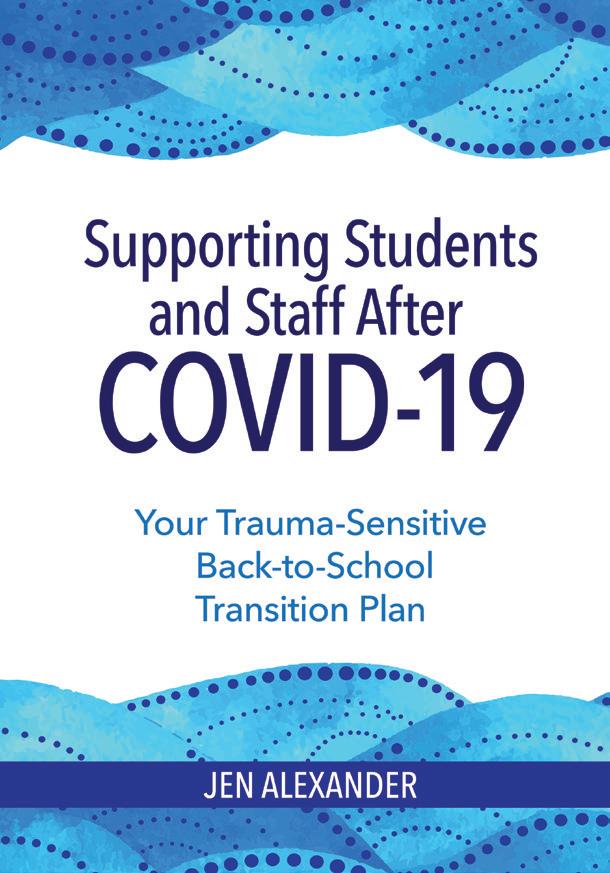
Supporting Students and Staff After COVID-19 Your Trauma-Sensitive Back-to-School Transition Plan
BESTSELLER!
MORE FROM “MS. JEN”
Watch her coffee chat and
Q&A video, get a FREE excerpt of Building Trauma-Sensitive
Schools, and read a blog post adapted from the book! http://bit.ly/WatchMsJen By Jen Alexander, M.A., NCC, SB-RPT
NEW
When schools reopen after COVID-19 closures, both students and staff will have experienced months of unprecedented challenges. Your elementary school will need a compassionate, intentional, trauma-sensitive plan for easing the back-to-school transition—and that’s what you’ll find in this practical new ebook from acclaimed trauma expert Jen Alexander.
You’ll get hands-on, adaptable guidance on designing and implementing a traumasensitive transition plan that puts relationships first, prioritizes emotional and social supports, breaks down barriers to learning, and empowers everyone in your learning community. And you’ll put your plan in action with more than 50 downloadable resources, including journal pages, handouts, activities, planning forms, posters, and professional development PowerPoint slides. Packed with the how-to information every educator will need, this must-have guide is your key to making a thoughtful, trauma-sensitive transition plan—and creating a learning environment that meets
$9.95 | PDF Stock #: 20202-54500 | ePub Stock #: 20202-54494 | 2020 | 112 pages | PDF ISBN 978-1-68125-450-0 | ePub ISBN 978-1-68125-449-4
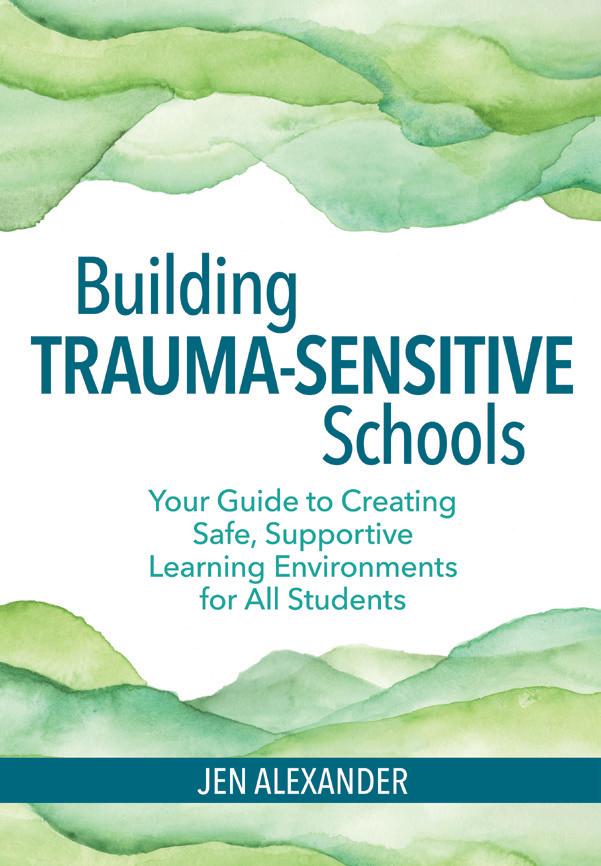
everyone’s needs better than ever. Building Trauma-Sensitive Schools Your Guide to Creating Safe, Supportive Learning Environments for All Students By Jen Alexander, M.A., NCC, SB-RPT
Drawing on her experience as a school counselor, trainer, and mother, Jen Alexander delivers a comprehensive framework for building a supportive, responsive, and trauma-sensitive school environment. You’ll start with an evidence-based introduction to the impact of trauma on a child’s development, attachment, and behavior. Then you’ll get an effective multi-tier system of support (MTSS) for developing a trauma-sensitive learning environment, including universal strategies (Tier 1) and more intensive interventions (Tier 2 and Tier 3) for students who need more support.
DISCOVER HOW TO: • Implement universal instructional strategies that foster safety, connection, regulation, and learning
Use special supports and coaching when universal strategies aren’t enough
Collaborate effectively with families and colleagues
Incorporate restorative discipline practices
Create a personalized self-care plan to reduce the effects of job-related stress PRACTICAL MATERIALS: Creative activities for teachers, powerful case stories, sample dialogues and scripts, reflection and brainstorming worksheets, downloadable forms, handouts for use with students
$29.95 | Stock #: 20202-52452 | 2019 | 248 pages | 7 x 10 | paperback | ISBN 978-1-68125-245-2
SOCIAL-EMOTIONAL LEARNING— THE FUN AND EASY WAY
BESTSELLERS!
Teach social-emotional competence— the foundation of school and social success—with the Strong Kids™ curricula! Developed by a team of education and mental health experts, Strong Kids is the fun and easy way to help your students develop the social-emotional skills they need to manage their challenges and succeed in school and life.
Each curriculum: $42.95
Easy to fit into your schedule. Each lesson takes about 20 minutes and can be broken into smaller chunks. 2016 | 8 ½ x 11 | paperback
Comes with everything you need: adaptable scripts, creative class activities, and printable worksheets and handouts. Teaches crucial skills your students will use forever: managing anger, reducing stress, solving interpersonal problems, and more.
“In a world where children see so much that’s negative, it’s so refreshing that we as a school can offer them a way to see the positive.“
—Joy Deates, Positive Behavior Support Facilitator, Central Point Elementary School, Oregon
CHOOSE FROM FIVE AGE-APPROPRIATE CURRICULA:
Merrell’s Strong Start—Pre-K and Merrell’s Strong Start—Grades K–2 by Sara A. Whitcomb, Ph.D., & Danielle M. Parisi Damico, Ph.D. Pre-K: Stock #: 20202-79697 | ISBN 978-1-59857-969-7 Grades K–2: Stock #: 20202-79703 | ISBN 978-1-59857-970-3 Merrell’s Strong Kids—Grades 3–5 and Grades 6–8; Merrell’s Strong Teens—Grades 9–12, by Dianna Carrizales-Engelmann, Ph.D., Laura L. Feuerborn, Ph.D., Barbara A. Gueldner, Ph.D., & Oanh K. Tran, Ph.D. Grades 3–5: Stock #: 20202-79536 | ISBN 978-1-59857-953-6 Grades 6–8: Stock #: 20202-79543 | ISBN 978-1-59857-954-3 Grades 9–12: Stock #: 20202-79550 | ISBN 978-1-59857-955-0
“Highly recommended . . . will prove invaluable to school professionals.“
—Lori Ernsperger, Executive Director, Behavioral Training Resource Center “Initiates incredible discussions that have lasting effects.“
—Linda Johnston, fifth-grade teacher, Yolanda Elementary, Springfield, Oregon
“A great asset to our social/emotional curriculum.“
—Suzanne Salmo, Social Worker, United Services for Children
Each age-appropriate curriculum includes everything you need!
ADAPTABLE SCRIPTS
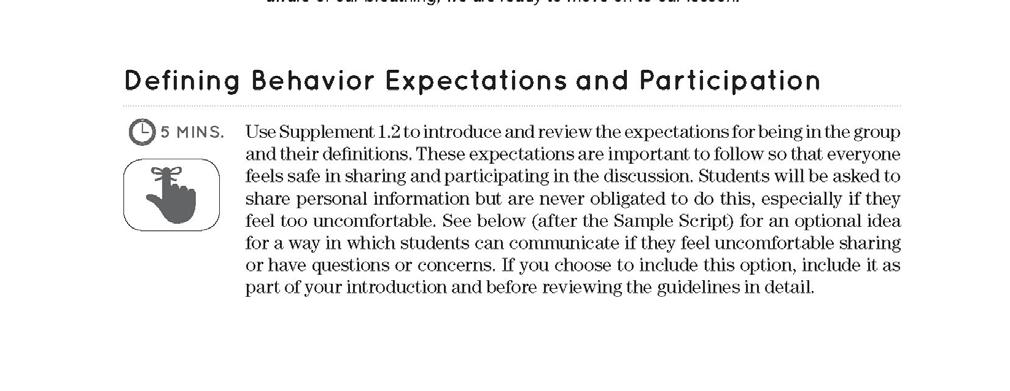
Engage students with thought-provoking classroom activities on key social-emotional topics. Take the guesswork out of lesson delivery with these sample scripts, easily adaptable
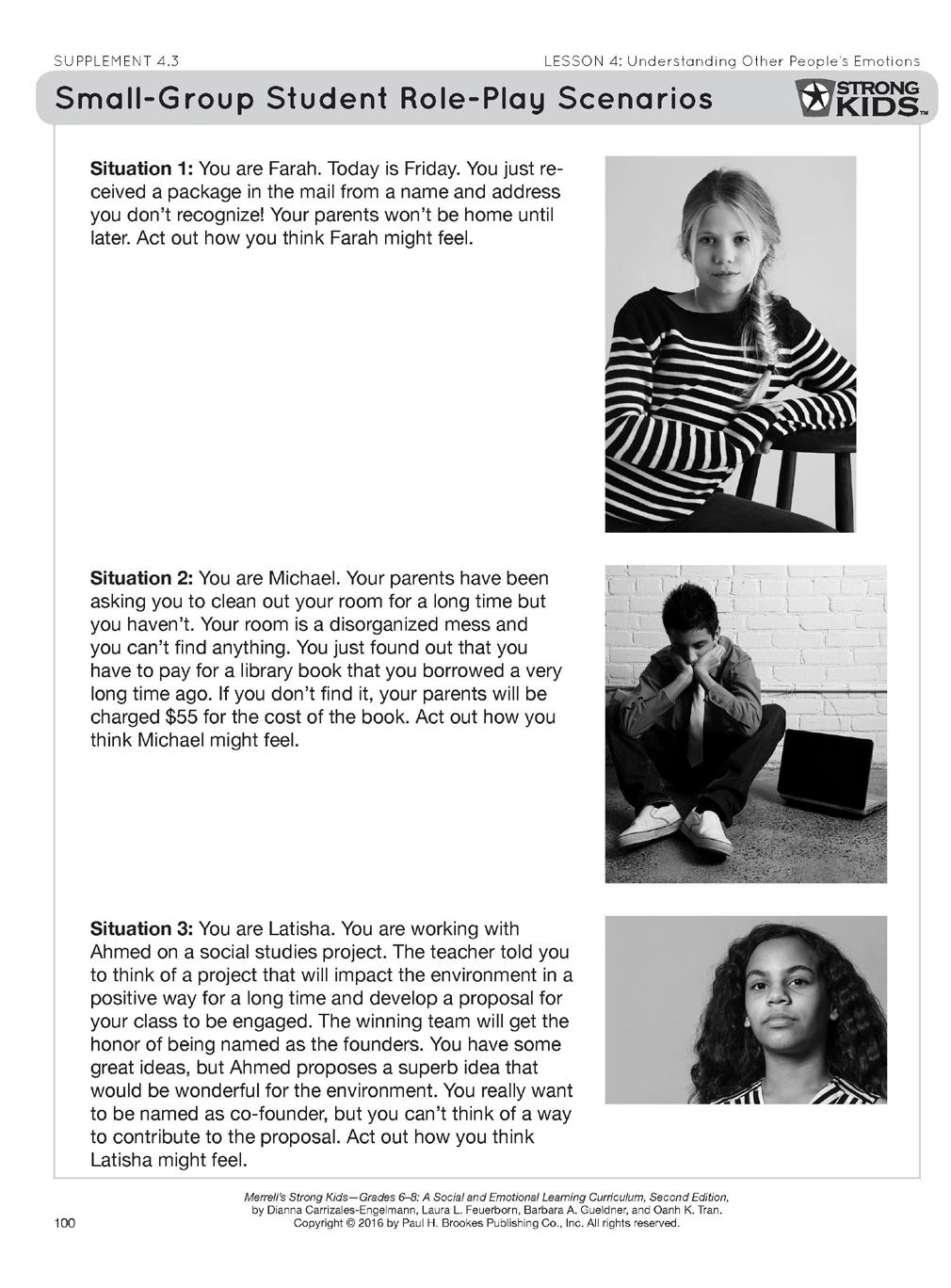
CLASS ACTIVITIES
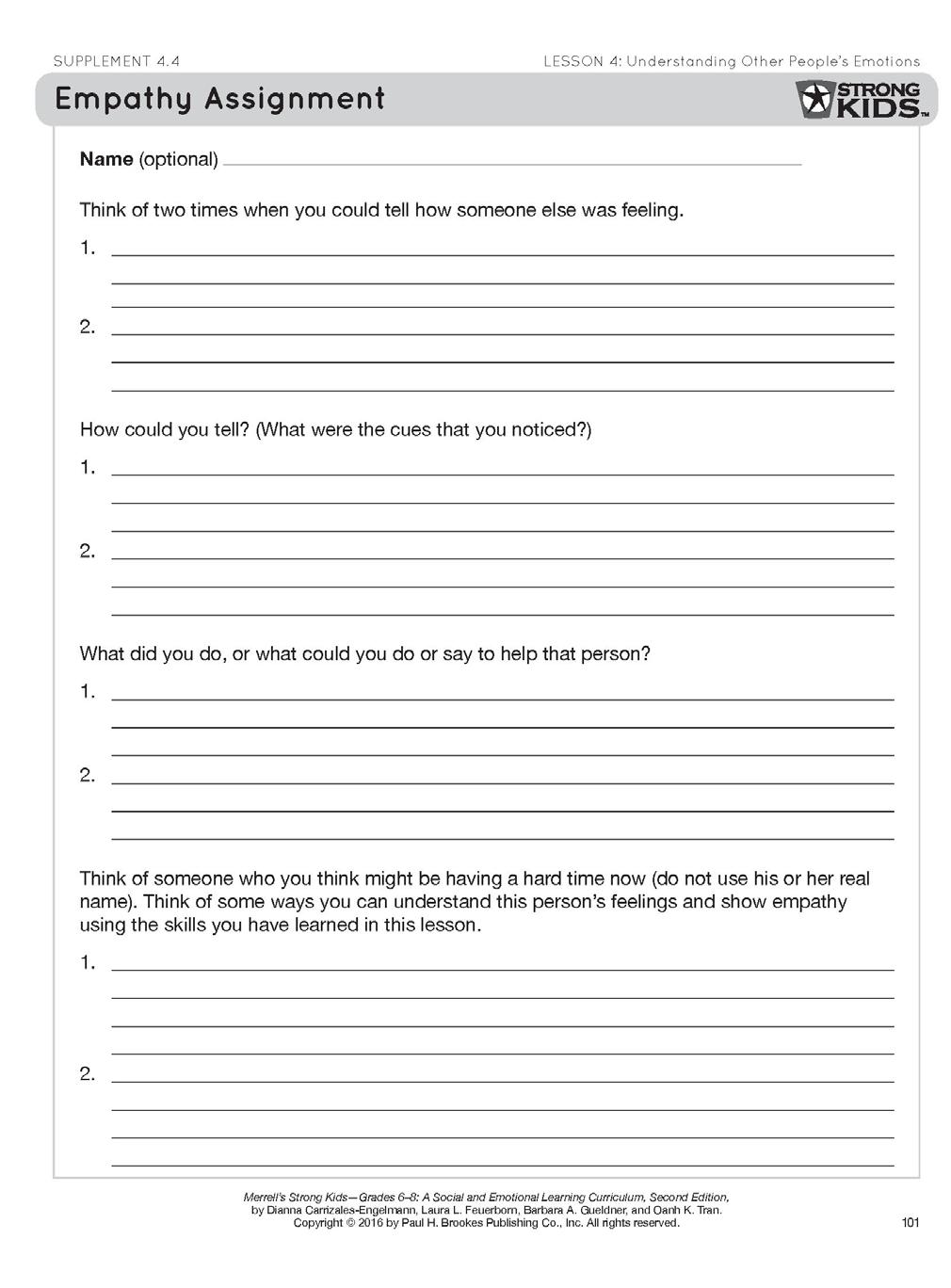
HANDOUTS
for any classroom. Encourage active practice of key concepts with worksheets and handouts, photocopiable and available as downloads
BESTSELLER!
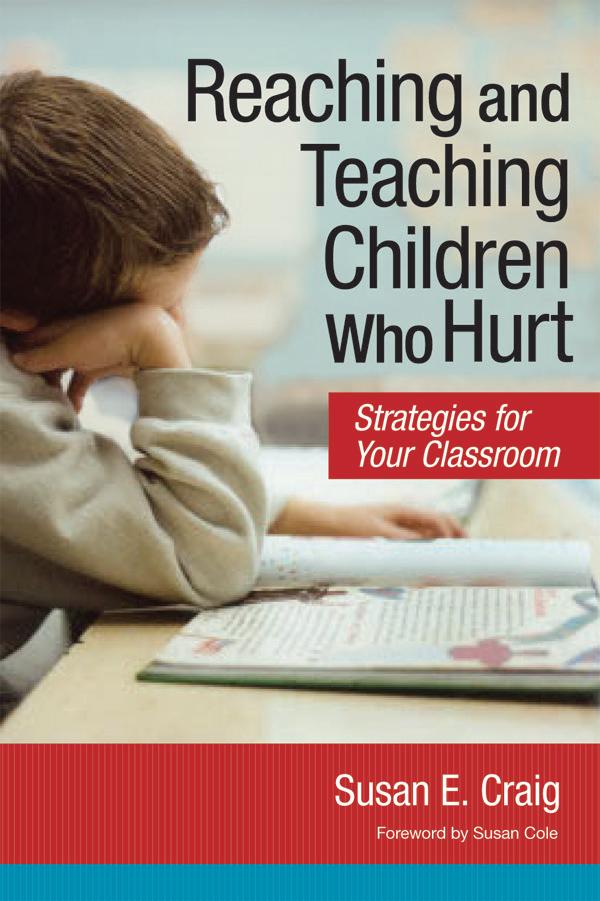
Reaching and Teaching Children Who Hurt Strategies for Your Classroom By Susan E. Craig, Ph.D.
“Guides teachers to think about and respond to behavior in ways that allow the child to feel calmer, more focused and more connected to adults.“—Lesley Koplow, Director, Center for Emotionally
Responsive Practice at Bank Street
How can you promote the academic and social success of students exposed to family violence and neglect—and help them build resilience and hope? This practical guide gives you dozens of simple, creative ideas—easy to use in any classroom, on any budget—that show you how to:
Adapt instruction to address learning characteristics of children exposed to trauma Guide students in literacy skills, problem-solving, selfregulation, and more Use positive behavior supports so children can stay calm and focused on learning Help students build supportive relationships with peers and teachers Provide predictable routines that instill a sense of safety and control Reduce the effects of “compassion fatigue” Directly teach social skills during everyday routines
Includes realistic sample scenarios and challenging What Would You Do? quizzes to help you respond skillfully in difficult situations.
Help students & families with positive behavior support
Prevent-TeachReinforce By Glen Dunlap, Ph.D., Rose Iovannone, Ph.D., Donald Kincaid, Ed.D., Kelly Wilson, B.S., Kathy Christiansen, M.S., & Phillip S. Strain, Ph.D.
Solve serious behavior challenges in K–8 classrooms with this practical, user-friendly guide to the Prevent-Teach-Reinforce (PTR) model. Developed by highly respected experts on positive behavior support, this research-proven model gives your school team a step-by-step blueprint for reducing problems unresolved by typical behavior management strategies. You’ll get explicit guidance on implementing all five steps of PTR: 1) teaming and goal-setting, 2) collecting data, 3) conducting a PTR Functional Behavioral Assessment, 4) developing a PTR behavior intervention plan, and 5) monitoring progress and making data-based decisions. Case examples illustrate components of PTR, and the forms (also available online) make implementation simple.
$49.95 | Stock #: 20202-50847 | 2019 | 216 pages | 8 ½ x 11 | paperback | ISBN 978-1-68125-084-7
PreventTeach-Reinforce for Families By Glen Dunlap, Ph.D., Phillip S. Strain, Ph.D., Janice K. Lee, M.Ed., BCBA, Jaclyn D. Joseph, M.S.W., BCBA, Christopher Vatland, Ph.D., & Lise Fox, Ph.D.
With the Prevent-TeachReinforce for Families (PTR-F) model in this accessible guidebook, you can use the proven PTR approach with families to help them prevent behavior challenges in children ages 2–10, teach proactive communication and social skills, and reinforce positive behavior. You’ll discover how to take on the role of PTR-F facilitator and meet each family’s unique needs through a clear 5-step process, from initiating the process with the family to monitoring behavioral data together. Printable forms and extended case examples guide you through the PTR-F steps and bring the process to life.
$44.95 | Stock #: 20202-79789 | 2017 | 240 pages | 8 ½ x 11 | paperback ISBN 978-1-59857-978-9



